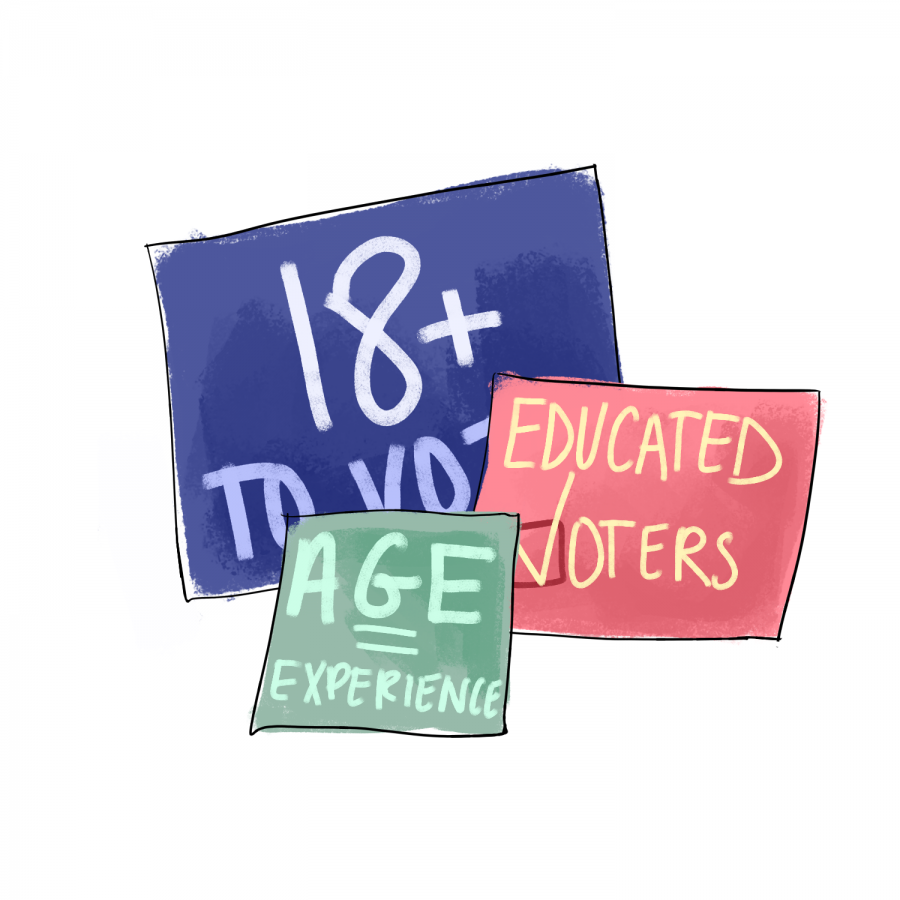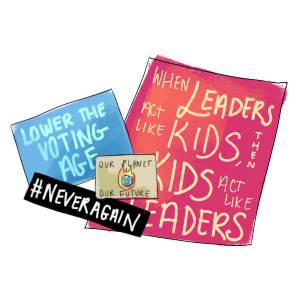Not all young people can be trusted with the immense responsibility of voting
Minors can not be trusted with the responsibility of voting. The voting age should remain at 18.
November 2, 2020
In 1971, the 26th Amendment lowered the U.S. voting age from 21 to 18 years old. Based largely on the work of young activists, some people are pushing for the voting age to be lowered once again to 16. Many people reason that this handful of young activists reflects the political competence of all the nation’s youth, however, when considering the political knowledge and maturity of the average minor teenager, it is clear that this group should not have the right to vote.
The main issue when discussing the minimum voting age is how informed minors are on current issues and candidates. While some teens may be well informed and mature enough to vote, many are not. Junior Elizabeth Mai said, “Because of the environment I grew up in, I would say I’m more informed than the current average voter … [but] the average person my age probably isn’t well informed.”
For many people, their knowledge of U.S. politics is limited to what they learned in their high school government class. While some go on to learn more in college or through their life experience as an adult, teenagers have not yet had that opportunity. Public schools do not teach important life skills such as how to file taxes or apply for jobs, and voting is no exception. While students learn the ins and outs of government procedure, they are not taught how to register to vote, mail in an absentee ballot, or research candidates. The practical aspects of preparing students to participate in a democracy are all too often ignored.
While many teachers supplement the curriculum with lessons on modern politics, class discussions often avoid topics that can become too controversial. Mai said, “School provides a good basic understanding of how government works, but it doesn’t really talk about current politics as much. It depends on your teachers, but most public education doesn’t really cover modern politics.” Young voters are forced to turn to outside resources of varying credibility to learn which candidates best represent their views, leading to great confusion. Lowering the voting age would only make this phenomenon more widespread.
While voters of any age can be affected by misinformation, this would be amplified in young and less mature voters. Government teacher Jonathan Taylor said, “I think it’s hard to give an across the board answer. I think some young people are mature enough and well informed certainly to participate in the democratic process. And other young people either aren’t necessarily ready or interested. I think it really just depends.” Due to the extreme disparities in political readiness across the nation, it is irresponsible to grant an entire group such a heavy responsibility.
Advocates often cite young activism as a justification to lower the voting age, but they fail to consider the impact of this activism itself. Lobbying, protests, social media campaigns and other forms of activism are vital ways of affecting government policy regardless of age, despite the fact that it may feel less direct or effective. Taylor said, “I wouldn’t say it’s less important, it’s equally important. It’s great to see kids invested and involved and [who] want to make their mark and get fellow classmates and friends interested as well. It’s very energizing to see.”
Richard Montgomery in particular has a strong culture of this student activism. Many students participated in protests surrounding the death of George Floyd and the recent Black Lives Matter movement. There has even been a push from students to change the name of the school to honor someone other than Richard Montgomery, who was a slave owner.
Many believe that young people, such as RM students, would have a large impact on elections but that is not necessarily true. Mai said, “If you were to let underage people, people who can’t vote, vote, I think it wouldn’t have that big of an impact, not enough. You would still need to influence other voters.” Voting is an important way of participating in the democratic process but it is not the only way, and being unable to vote is not preventing young people from making a difference.
Another argument for lowering the voting age is that it would result in a more consistent voting base since it would normalize exercising one’s civic duties during their developing years. However, according to the New York Times, increased political participation stems from witnessing your parents vote, participating in political discussions at home and participating in political activities. The habit of voting is formed from the environment one was raised in, regardless of whether or not they have the ability to vote.
While the consequences of lowering the voting age may not be detrimental to the state of the nation, the benefits of doing so are not dramatic enough to initiate this change. For the few 16 and 17 year-olds that actively participate in activism, they already have the effective platforms of advocacy and protests to get their voices heard, so voting does not necessarily create the change they are seeking. There are many other issues facing the U.S., and fighting for minors to be able to vote is a waste of effort when they will gain the right in two years.




